Book Reviews by antónio louçã
Herramienta, 2009
¿Fue la "Revolución de los claveles" un mero intento de modelar la sociedad de acuerdo a "utopías... more ¿Fue la "Revolución de los claveles" un mero intento de modelar la sociedad de acuerdo a "utopías irresponsables"? Por pensar así, por pensar que sí, la derecha continúa todavía hoy mostrándose incapaz de entender lo que pasó. En realidad, la chispa que habría de incendiar la pradera era sólo una: la repugnancia a hacer la guerra. Prosaica, minimalista, conservadora y todo lo que se le quiera llamar, esa repugnancia era, en el contexto de entonces, altamente implosiva. Fue ella, y no alguna "utopía", la que llevó a la implosión del fascismo.
junge Welt, 2017
Im Jahre 1976 wurde Mário Soares zum ersten Mal Regierungschef, 1978 zum zweiten Mal. Ab 1981 sta... more Im Jahre 1976 wurde Mário Soares zum ersten Mal Regierungschef, 1978 zum zweiten Mal. Ab 1981 stand er erneut einem Kabinett vor. Immer setzte er auf eine rücksichtslose »Sparpolitik«. Zwischen 1986 und 1996 war Soares in zwei Amtsperioden Staatspräsident.
Zwischen 1986 und 1996 war Soares in zwei Amtsperioden taatspräsident. In diesem Falle aber fungierte er als linkes Bollwerk gegen die rechten Regierung von Aníbal Cavaco Silva. Seine späteren Bewerbungen für das Amt des Vorsitzenden des EU-Parlaments (1999) und erneut für das des portugiesischen Staatspräsidenten (2006) scheiterten. Danach überraschte Soares mit einer rhetorischen Annäherung an linke Bewegungen, dem freundlichen Austausch mit Hugo Chávez und dem Liebäugeln mit Globalisierungsgegnern.
Doch seine historische Rolle bleibt die des Totengräbers der Nelkenrevolution.
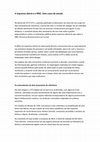
RTP, 2021
No biénio de 1974-1975, a opinião publicada na Alemanha, tal como ela nos surge em dois semanário... more No biénio de 1974-1975, a opinião publicada na Alemanha, tal como ela nos surge em dois semanários de referência, o jornal Die Zeit e a revista Der Spiegel, foi um indicador da atitude dominante no país face ao processo revolucionário português. A esta distância, o conteúdo desses dois semanários diz-nos mais sobre a grelha interpretativa e sobre as inclinações políticas desta imprensa alemã do que sobre o PREC (Processo Revolucionário em Curso). O défice da imprensa alemã em observação directa e presencial nota-se especialmente nos primeiros tempos do processo e vai sendo colmatado, aqui e ali, com o recurso a jornalistas enviados ad hoc, muitas vezes a partir das delegações que essa imprensa tradicionalmente mantinha em Madrid, como relatou à RTP o adido social da Embaixada, Hans-Ulrich Bünger. Nas páginas dos dois semanários continuam portanto a abundar comentários a partir de informação das agências noticiosas. As reportagens realizadas em visitas fugazes, mesmo quando brilham pelo poder de observação ou pela vivacidade do relato, continuam a ressentir-se da falta de um enraizamento social que só jornalistas residentes podem ir construindo com o tempo. Estas são características comuns aos dois semanários que aqui analisamos. Os antecedentes de dois semanários de referência Die Zeit chegara a 1974 depois de um percurso acidentado, com algumas crises internas, suscitadas ora pelo envolvimento de alguns dos seus responsáveis com o nacional-socialismo, ora por opções editoriais branqueadoras de alguma proeminente figura intelectual do nazismo, ora ainda por convulsões originadas em práticas censórias. Em meados da década de 1950, uma dessas crises redundara na estabilização de uma linha mais liberal, em que a partir de certa altura pontificou um dos máximos expoentes da social-democracia: Helmut Schmidt, entretanto ascendido a ministro da Defesa e depois, finalmente, a chanceler. No momento em que eclode a revolução de Abril, o chefe de redação de Die Zeit é Theo Sommer, anteriormente um dos lugares-tenentes de Schmidt no Ministério da Defesa e estreitamente ligado a ele em várias fases da sua carreira. Da redação chefiada por Sommer faz parte Horst Bieber, ao tempo um jornalista de 32 anos, mas já com uma reputação de saber enciclopédico que o acompanha como uma sombra. Bieber irá mais tarde deixar a carreira jornalística e tornar-se um autor de sucesso no género das novelas policiais.
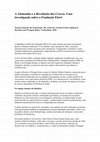
RTP Notícias, 2020
A República Federal da Alemanha (RFA) foi o país europeu que mais activamente apoiou a ditadura s... more A República Federal da Alemanha (RFA) foi o país europeu que mais activamente apoiou a ditadura salazarista. E foi também o país europeu de onde a oposição antisalazarista recebeu um apoio mais substancial. Compreender o paradoxo é meio caminho andado para compreender o papel decisivo da RFA no processo de controlar e dominar a Revolução dos Cravos. O livro de Peter Birle e Antonio Muñoz Sánchez, publicado em julho deste ano, tem como tema o trabalho da Friedrich Ebert Stiftung (FES), fundação ligada ao SPD, no Brasil e em Portugal durante os últimos anos das respectivas ditaduras, durante a transição e durante os primeiros anos dos regimes democráticos que depois se estabeleceram. A parte referente a Portugal ficou a cargo de António Muñoz Sánchez e apresenta para o público português a inestimável vantagem de se basear não só em arquivos já relativamente explorados por investigações portuguesas (como o arquivo político do Auswärtiges Amt, equivalente alemão do MNE, ou o Bundesarchiv, em Koblenz), como noutros menos explorados (o da Fundação, em Bona), ou mesmo em arquivos pessoais de actores importantes da História de então. Os amigos alemães da ditadura Sánchez recorda por um lado o contexto internacional em que se deram os primeiros confrontos da guerra colonial, sustentando que Salazar, na ausência de um apoio britânico ou norte-americano à sua obstinação colonialista, só pôde decidir-se pela guerra devido aos apoios francês e alemão-nenhum deles assumido publicamente, num ambiente internacional favorável às independências africanas. O apoio alemão em especial foi concedido com requintes do mais elaborado secretismo, mas beneficiando também do empenhamento de personalidades destinadas a altos voos na política alemã, como Richard Jäger, ministro da Justiça de Adenauer e mais tarde presidente do Bundestag. Em termos práticos, foi decisivo o líder bávaro Franz-Joseph Strauss que, como ministro federal da Defesa, urdiu toda a teia para o acordo secreto luso-alemão de 1960. Aí se incluíam a base aérea de Beja, a base militar de Alcochete, armazéns da Bundeswehr em Setúbal e, reciprocamente, a venda de armamento alemão a Portugal. Por outro lado, não deixa de ser significativo que inicialmente Strauss tenha considerado prudente ocultar os detalhes do acordo aos próprios colegas ministros. A RFA movia-se num contexto internacional altamente volátil e em Junho de 1966, quando Amílcar Cabral denunciou bombardeamentos feitos na guerra colonial com aviões alemães, o Governo de "Grande Coligação" que sucedera a Adenauer ponderou mesmo encerrar o aeroporto de Beja e limitar drasticamente a cooperação militar com Portugal.

RTP, 2020
Am 11. März 1975 scheiterte der Putschversuch des früheren Staatspräsidenten, General Spínola. Ei... more Am 11. März 1975 scheiterte der Putschversuch des früheren Staatspräsidenten, General Spínola. Eine Kaserne in Lissabon, Hochburg der Linken, wurde von der Luftwaffe bombardiert, von Falschirmspringern umkreist, die nahestehende Bevölkerung mobilisierte sich, der Sturmversuch scheiterte.
Die meisten Putschisten flüchteten nach Franco-Spanien, vier jedoch, darunter der General Freire Damião suchten in der BRD-Botschaft Zuflucht. Gerade am Tag und um die Uhrzeit des Putsches landete in Lissabon, vermutlich nur ein Zufall, der Staatssekretär Karl Moersch (FDP), später Staatsminister. Er unterkamm in der Botschaft, aber es ist nichts über eine Rolle Moerschs in der Flüchtlingskrise bekannt.
Asyl konnten die Vier allerdings in der Botschaft nicht bekommen, es gab ja keine Asylvereinbarung zwischen Portugal und Deutschland.
Ausserdem wollte der deutsche Botschafter Fritz Caspari seine Beizehungen zu den portugiesischen Machthabern nicht durch einen Anschein von Komplizenschaft mit den Putschisten schaden. Caspari war ein Ausnahmefall im deutschen diplomatischen Dienst, denn er war kein Nazi gewesen. Seine Rolle in der Nelkenrevolution ist bis jetzt weniger von der Geschichtswissenschaft beachtet als er eigentlich verdient hätte. Aber sein amerikanischer Pendant, Frank Carlucci, hat öffentlich bezeugt wie er bei Caspari das Verständnis gefunden hat, das er bei seinem Boss, Henry Kissinger, nicht finden konnte.
Beide, Carlucci und Caspari, setzten auf Wahlen und nicht auf Putschen. Nicht überraschend, also, dass die Botschaft den Staatspräsidenten, General Costa Gomes, sofort von der Anwesenheit der Vier Flüchtlinge im Botschaftsgebäude informierte. Allerdings übermittelte sie ihm auch die Bitte der Vier, die einen Freigeleit nach Spanien wollten.
Gomes wollte eine Nacht Bedenkzeit. Aber in der Nacht vom 11. zum 12. März hat er eigentlich nicht geschlaffen, denn er musste eine militärische Versammlung 200 Militärs, meistens Offizieren, vorsitzen, die entschieden haben, eine neue Regierung und einen Revolutionsrat zu gründen, die ganze Finanzwirtschaft, sämtliche Banken also, und die Grossindustrie zu verstaatlichen, die Streitkräfte zu säubern, und die Wahlen am 25. April zu bestätigen. Auf der Tagesordnung stand auch die Diskussion über die eventuelle Erschiessung der Putschisten, die abgelehnt wurde.
Am Morgen früh liess Gomes den Botschafter Fritz Caspari wissen, er würde keinen Freigeleit gewähren und die Vier mussten sich einfach ergeben. Aus Bonn hatte die Botschaft Anweisung, auf den Freigeleit zu bestehen. Caspari machte sich also auf dem Weg zum Präsidentenpalast, um zu verhandeln. Mittlerweile waren schon Hunderte Demonstranten, alarmiert über die Anwesenheit der Vier, vor den Toren der Botschaft gezogen. Casparis Dienstwagen wurde bei der Ausfahrt durchsucht und, als er sich bei den anwesenden Truppen beschwehrte, haben diese ihre Maschinengewehren auf ihn gerichtet. Später legte er einen formellen Protest darüber, hörte von den portugiesischen Behörden bloss die Antwort, sie konnten sich nicht mehr auf die Truppen verlassen.
Mit Gomes hat schliesslich Caspari eine Einigung getroffen, wobei die Vier sich ergeben, sie werden vor normalen, nicht vor Sondergerichten gestellt, sie behalten ihren Rang bis zum Gerichtsurteil und die Familien dürfen nach Deutschland fliegen, wenn sie so wollen. Fünf Familienangehörige des Generals Freire Damião machten von dieser Bedingung Gebrauch, unterkammen in Baden-Würtemberg. Alle andere meinten, sie seien in Portugal in Sicherheit.
Dann musste der Botschafter unter militärischer Schutz, auf einem Panzer, in die Botschaft zurück, und mussten die Vier aus der Botschaft in Panzern evakuiert werden.
In den folgenden Monaten, gab es viel Nachspiel. Ein Ausschuss des Bundestags debatierte darüber, Moersch war Wortträger der Bonner Regierung, die von der CDU/CSU unter heftiger Kritik stand, weil sie angeblich die Vier nicht hätte ergeben dürfen. Die Botschaft musste sich rechtfertigen, teils durch Hinweise auf ihre Sicherheitslage, teils auf die ehrenhafte Behandlung der Vier. Ab und zu kamen wieder Gerüchte über die Gründung eines Sondergerichts, die die Botschaft beunruhigten, aber es war nichts drin. Die Vier sind ein Jahr in Haft geblieben, wurden dann amnestiert und haben sich bei der Botschaft bedankt.

Synopsis of the book "O segredo da Rua do Século. As ligações perigosas de um dirigente judeu com a Alemanha nazi. 1935-1939", 2007
Only once, did the Third Reich decorate a Jewish leader. In 1935, the president of the Comunidade... more Only once, did the Third Reich decorate a Jewish leader. In 1935, the president of the Comunidade Israelita de Lisboa, (CIL) received the 1rst class Merit Cross of the German Red Cross. A few years later, the World Jewish Congress (WJC) froze its relations with the Portuguese Jewish community, but kept the silence on the subject. The evidences of this story are now presented for the first time in a Swiss-Portuguese research published in Lisbon by „Fim de Século".
The economist Moses Bensabat Amzalak, born in 1892, became the president of the CIL in 1927 and remained for 52 years, until his death in 1978, its indisputable political and spiritual leader. After him, the community knew several short-living leaderships, none of them comparable to Amzalak's importance and charisma. Until now, his followers have always remembered him as an example.
But Amzalak was also a very important personality in the handful of Portuguese fascist leaders, and not only because of his personal friendship with the Portuguese dictator Salazar. He was one of the owners of the daily newspaper O Século, the ideological organ of the military coup that destroyed the First Republic. Moreover, O Século clearly supported in January 1935 Hitler's policy about the Sarre. In the meantime, Amzalak was opening in the institute of economics, whose director he was, a bureau for German studies, financed by the Third Reich, and meant to reinforce the connections between the Portuguese university and the nazified academic world of Germany.
The head of the German Legation to Lisbon, Baron von Hoyningen-Huene, was deeply grateful for these achievements. On the 26 th and on the 28th of January that year, he visited Amzalak's institute and reciprocally invited the Jewish leader for a dinner party in the German Legation. Three weeks later, Huene sent a letter to the German Foreign Office (AA), suggesting that a high decoration of the German Red Cross be given to Amzalak. By the same time, O Século was printing a special edition of nazi propaganda. According to Huene's letter, Amzalak's pro-German achievements should let the AA put his jewishness aside. And so it did: in July 1935, Amzalak received the German decoration.
During the four following years O Século made a permanent propaganda of nazi policies, sometimes even against Salazar's politics. When the Portuguese diplomats voted in Geneva against the remilitarisation of Rhineland, O Século greeted it. Germany's support to Franco's Spain had more importance for the newspaper than the Nuremberg laws against the Jews, which were never targeted by any criticism of O Século.
In 1937 Amzalak asked Huene to get a miniature of the decoration, so that he could use it in social events. A few weeks later, he received a letter from Huene, thanking him for his „collaboration". And he soon received a new visit of the diplomat at his institute, which gave him his first occasion to show the decoration in public. The „collaboration" was to last until 1939 and to strongly upset the powerful British Embassy in Lisbon. As for Amzalak, he would remember those years much later as « the most beautiful » of his life.
During the War, Portugal became the only exit gate out of Europe for tenths of thousands of refugees. The main international organisation for the relief of Jewish refugees addressed Amzalak, gave him important sums and entrusted him with quartering, feeding and organising the departure of those refugees to overseas. However, one representative of the WCJ, Isaac Weissman, a refugee himself, colided with Amzalak and therefore denounced his former collaboration with the nazis. The WJC believed Weissman's and other refugees' charges, who openly criticized the Jewish leader, distanced itself and cooled down its relations with the CIL. It was only in 1951, when Weissman left to Israel, that a normal relationship was re-established.
The polemics about Amzalak started in 2005, when the historian António Louçã mentioned Weissman's charges in a book that he published. By that time, it was clear that O Século had served the nazi propaganda, but a doubt remained about Weissman's charges on the decoration. The CIL reacted vigorously against the statements of the Portuguese historian, labelling them as wrong and slandering and promised to make a research together with the WJC in order to clean the name of its former leader.
The WCJ did not say anything about the subject and the CIL has also preferred in the meantime to drop it. But Louçã and Paccaud went on with their own research and found in the Political Archives of the German Foreign Office the « smoking gun », proving the decoration and in the Portuguese archives several photos proving the complicity Amzalak-Huene. The results of their research came out now in a book by the publishing house Fim de Século under the title O segredo da rua d'O Século.
Only once, did the Third Reich decorate a Jewish leader. In 1935, the president of the Comunidade Israelita de Lisboa, (CIL) received the 1rst class Merit Cross of the German Red Cross. A few years later, the World Jewish Congress (WJC) froze its relations with the Portuguese Jewish community, but kept the silence on the subject. The evidences of this story are now presented for the first time in a Swiss-Portuguese research published in Lisbon by „Fim de Século".
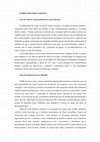
História", número especial, 2007
O bolchevismo do tempo de Lenine sempre encarou a revolução na Rússia atrasada e camponesa como u... more O bolchevismo do tempo de Lenine sempre encarou a revolução na Rússia atrasada e camponesa como uma espécie de prelúdio ao que verdadeiramente importava, a revolução alemã. Lenine e Trotsky gostavam de afirmar que a principal tarefa do poder soviético era "ganhar tempo" até o proletariado alemão tomar o poder. Lenine afirmava que a revolução russa devia estar disposta a morrer pela revolução alemã. Na hipótese mais favorável, a ideia de uma federação socialista encabeçada pela Alemanha permitia encarar uma divisão internacional de trabalho em que a atrasada Rússia estabelecesse um plano de desenvolvimento orgânico e faseado, sem os ritmos traumáticos do "comunismo de guerra" ou da industrialização e da colectivização em marchas forçadas. A prioridade objectiva da revolução alemã não oferecia, pois, qualquer dúvida. A questão mais complexa é a de saber se, apesar do atraso do seu país, os bolcheviques se consideravam, subjectivamente, um modelo a seguir na Alemanha. Por outras palavras: supunham os dirigentes bolcheviques, principalmente a partir de 1917, que a tarefa principal dos revolucionários alemães consistia em absorverem e imitarem a experiência russa? A esta interrogação tentaremos esboçar uma resposta nas linhas que se seguem. Antes da Primeira Guerra Mundial O SPD foi desde cedo a coluna vertebral da Segunda Internacional, reconhecido como tal pela generalidade dos outros partidos do movimento. Os dirigentes russos não constituíam excepção e com frequência recorriam à autoridade dos seus camaradas alemães para arbitrarem conflitos especificamente russos. Assim, na sua acesa polémica contra os economicistas, Lenine invocou em "Que fazer?" a autoridade do principal teórico marxista do seu tempo, Karl Kautsky, a favor da tese de que a consciência socialista deveria ser introduzida no proletariado a partir "de fora". Mais tarde, em plena revolução de 1905, citou ainda o mesmo Kautsky contra o decano do marxismo russo, Plekhanov, que lamentava o recurso às armas por parte do proletariado russo. Ainda em 1910, Kautsky continuou a ser poupado por Lenine e por Trotsky, quando se envolveu numa discussão que o afastaria pessoalmente de Rosa Luxemburg. Perante um movimento pelo sufrágio universal e pela abolição da monarquia prussiana, Kautsky argumentava que só o socialismo, e não a implantação da república, poderia trazer verdadeiras soluções. Rosa, pelo contrário, solidarizava-se com o movimento e proclamava que o maximalismo retórico de Kautsky apenas reflectia a sua cobardia política. Lenine absteve-se de tomar posição a favor de Rosa; Trotsky foi mesmo mais longe, censurando à revolucionária
"A revolução russa 100 anos depois", 2017
Synopsys of the article published in the book "A revolução russa 100 anos depois", Lisboa, Ed. Pa... more Synopsys of the article published in the book "A revolução russa 100 anos depois", Lisboa, Ed. Parsifal
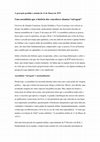
Mudar de vida, 2019
Uma assembleia que a história dos vencedores chamou "selvagem" Um livro de Almada Contreiras, Jac... more Uma assembleia que a história dos vencedores chamou "selvagem" Um livro de Almada Contreiras, Jacinto Godinho e Vasco Lourenço veio colocar ao alcance do público a transcrição, praticamente integral, das discussões havidas na famosa assembleia de 11 para 12 de março de 1975. A assembleia realizou-se poucas horas após o putsch spinolista, em que o RAL 1 foi bombardeado por aviões da Força Aérea e cercado por tropas pára-quedistas, com um saldo de um morto e quinze feridos. As bobines com o registo áudio da assembleia, dadas como perdidas durante muitos anos, são uma fonte fundamental para compreender o que se passou. E isso já bastaria para a publicação ser aplaudida e os seus promotores felicitados pela iniciativa. Sobre a história das bobines agora recuperadas, sobre a sua longa hibernação e sobre o condicionamento com que elas foram depositadas no arquivo da RTP muito haveria a dizer, mas noutro lugar e noutro momento. As linhas que se seguem focar-se-ão apenas na visão que as transcrições proporcionam sobre a assembleia e em alguma mudança de perspectiva que impõem sobre o seu significado. Assembleia "selvagem" e nacionalizações Desde logo, a assembleia foi encarada durante todos estes anos como ponto de viragem política-algo que a leitura da transcrição obriga a relativizar. Houve, sem dúvida, uma acentuada viragem em vários aspectos da política do país. Mas, depois de lermos a transcrição do debate dessa noite, não poderemos dizer que a assembleia tenha sido o deus ex machina que operou a viragem. A grande contribuição dos nossos três autores, ao publicarem a transcrição em livro, é a de permitirem que seja colocada no seu lugar essa importante assembleia, questionando o fetichismo interpretativo que fazia dela um verdadeiro e dramático contra-golpe da esquerda militar. Surpreendentemente, contudo, o título que escolheram para o livro faz-se eco da visão mais apocalíptica: "A noite que mudou a revolução de Abril" (como subtítulo: "A assembleia militar de 11 de Março de 1975"). Sob uma forte pressão da esquerda militar, especialmente da 5ª Divisão e do RAL 1 bombardeado nessa manhã, a improvisada reunião foi convocada pelo presidente da
Drafts by antónio louçã
Die Varela Gomes-Biographie versucht den Mann, der als erster zu den Waffen gegen den Kolonialkri... more Die Varela Gomes-Biographie versucht den Mann, der als erster zu den Waffen gegen den Kolonialkrieg griff, als letzter die Waffen gegen die Konterrevolution niederstreckte, im geschichtlichen Zusammenhang zu stellen.

On the 11th march 1975, one Portuguese general and three more officers asked for shelter in the G... more On the 11th march 1975, one Portuguese general and three more officers asked for shelter in the German Embassy to Lisbon. They had been involved in the putsch earlier that day, when the barracks of RAL-1 had been bombed and attacked by paratroopers. They feared for their lives after the defeat of the putsch. Now they wanted a safe conduct for Franco Spain. The Embassy made them clear that they could be sheltered just for a few hours and their presence in the facilities of the Embassy had to be reported to the Portuguese Government. The Ambassador Fritz Caspari got orders from Bonn to ask the Portuguese Government for the safe conduct to Spain and so he did. But the Portuguese Government eventually denied this request and demanded the unconditional surrender of the four refugees. The Embassy asked for guarantees that the four would be tried under the common law and by common courts, not under emergency laws. After the negotiations with the Portuguese Government, the Ambassador could only pass through the demonstrators that surrounded the Embassy inside an armoured car. And the four putschists could only get out in an armoured car.They stayed in prison for one year and then were released without a trial.
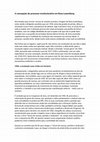
Rosa Luxemburg did not pretend to know everything that the Bolsheviks ignored or to own a recipe ... more Rosa Luxemburg did not pretend to know everything that the Bolsheviks ignored or to own a recipe that they were lacking. On the contrary, her view of the revolutionnary process underwent major changes between late1906, as she wrote her seminal book about the 1905 revolution, and November 1918, as she got in touch for the first time with soviet-like organisations.
An attentive reading of Rosa Luxemburg's "Mass strike, party and unions", of her letters, of her 1918 writings on the Russian Revolution, including the Breslau-paper "Zur russischen Revolution", shows that she highly valued the central role of the mass movement, but not the soviets, which she nearly ignores in 1906 and she just mentions scarcely in the summer 1918, in Breslau. Her reservations about the Bolshevik policy towards the Constituant Assembly are the rear side of her ignoring the soviets.
But immediately after the outbreak of the German Revolution, her liberation from Breslau and her arrival in Berlin, Rosa Luxemburg starts making the case for a Government of the Workers' and Soldiers' Councils and against the elections for a German Constituant Assembly. The last two months of her life are the time for a spectacular turn in her attitude towards the Soviets.
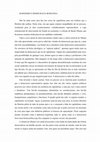
Congresso Karl Marx, 2008
Não há nada como uma das tais crises do capitalismo para nos lembrar que a História não acabou. D... more Não há nada como uma das tais crises do capitalismo para nos lembrar que a História não acabou. Desta crise, em que agora estamos mergulhados até ao pescoço, resultaram para já dois acontecimentos verdadeiramente espectaculares: a vaga internacional de intervenções do Estado na economia e a eleição de Barak Obama, que há poucas semanas ainda parecia um candidato condenado. Tanto a nova moda de intervencionismo estatal como a vitória eleitoral de Obama têm sido apresentadas como prova cabal das virtudes da democracia que para já, e para não ferir susceptibilidades, vou limitar-me a classificar como democracia representativa. Os corretores da bolsa ideológica, os "opinion makers", apostam agora muito mais na longevidade da democracia que na do capitalismo. Alguns dos surpreendidos pela crise, pela possibilidade de qualquer crise, deitam agora as mãos à cabeça e profetizam o fim iminente do capitalismo. Mas ninguém vai tão longe sobre a democracia representativa.
Books by antónio louçã

Conspiradores e traficantes. Portugal no tráfico de armas e divisas nos anos do nazismo (19331945), 2005
The Versailles Treaty forbade Germany to export weaponry. German corporations like Krupp or the s... more The Versailles Treaty forbade Germany to export weaponry. German corporations like Krupp or the state-owned Rheinmetall circumvented the interdiction by making joint-ventures with foreign partners. One of them was the Waffenfabrik Solothurn, in Switzerland, in its early years a façade for Rheinmetall. The founding fathers of the Solothurn factory were the German Hans Eltze, a senior weapons-engineer; and the Austrian millionaire Fritz Mandl, known as the "Munitions-King". Eltze was above all a businessman, doing whatever suited his business interests. Mandl was a Jew converted to the catholic faith, main donor to the austrofascist militia Heiwmwehr. Both soon associated themselves with a third partner, Waldemar Pabst, the leader of the Luxemburg and Liebknecht murder operation. Pabst had had to flee Germany because of his involvement in several putsch attempts and in Austria he had become the main organiser of the Heimwehr behind the scenes. All three of them, as well as the Austrofascists in general, were in the early 1930s closer to Mussolini than to Hitler. But soon the NS-hegemony brought them to reason. Eltze joined the NSDAP as early as 1933, and was to be the key actor in German military aid to Franco. He turned Portugal into the turning plate for this aid: by the beginning of the Spanish Civil War, Portugal suddenly became in the official statistics the first European purchaser of German weapons. Short thereafter, Eltze was to become the grey eminence of the German Legation in Lisbon, a personal friend of the Portuguese dictator Salazar during World War II and the leader of the critical tungsten negotiations with Portugal. Mandl tried to get in good terms with the nazis, but as a Jew according to the Nuremberg laws he did not trust them and went to live in Argentina. He could, however, keep some business arrangements with Germany. With Eltze in Portugal and Mandl in Argentina, Pabst became the CEO of the important Solothurn factory.
In the specific case of Portugal, the exports of German weaponry not only took the place of the British Vickers-Armstrong, for many years the main supplier of the Portuguese Army, but also succeeded in beating the competing Italian offer. During the war, German weapons came to be critical in the negotiations about tungsten, being the most coveted goods that Germany had for an exchange with tungsten. Eltze was the right man to lead this kind of negotiation.
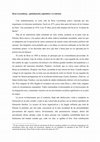
Introducción a "Que quiere la Liga Espártaco?", Ediciones La Minga, Buenos Aires, 2009
Casi simbólicamente, la corta vida de Rosa Luxemburg estuvo marcada por dos importantes revolucio... more Casi simbólicamente, la corta vida de Rosa Luxemburg estuvo marcada por dos importantes revoluciones proletarias. Nació en 1871, pocos días antes del inicio de la Comuna de París. Fue asesinada en 1919, a los 47 años, pocos días después del fin de la "Comuna de Berlín". Hija de un matrimonio judío asimilado de clase media, residente en la parte rusa de Polonia, Rosa estuvo, a los quince años de edad, todavía estudiante secundaria, entre los que se indignaron por la ejecución de cuatro sentencias de muerte contra adversarios políticos del zarismo. Sus biógrafos creen probable que a esa altura ya estuviera militando en las filas del socialismo polaco. A los dieciocho años tuvo que huir a Suiza para no ser apresada por la policía rusa (la Ojrana). El exilio de Rosa en 1889 se destaca en principio por su extraordinaria precocidad. Se sitúa entre un primer viaje de exilios, al inicio de los años 80, y una segunda ola, en los años del cambio de siglo. La primera ola incluyó a los últimos grandes hombres del populismo y a los primeros del marxismo (Zasúlich, Plejánov, Axelrod), que en varios casos salieron de Rusia ya treintañeros. Después vino Rosa, escondida en una carroza de heno. Cuando empezó a llegar la ola siguiente, ella ya tenía casi una década de exilio en Zurich. En esa segunda ola venían los futuros protagonistas de la revolución bolchevique (Lenin, Kaménev, Zinóviev, el futuro bolchevique Trotsky), con una media de edades nítidamente inferior a los de la primera ola. Pero ninguno de ellos llegaba al extranjero tan joven como Rosa y, sobre todo, ninguno venía en circunstancias semejantes. Todos continuaban evolucionando en el microcosmos de la emigración rusa y mantenían vínculos con un movimiento socialista significativo en su país de origen. La joven revolucionaria, por el contrario, llegó aún adolescente, venía a completar su formación en un país extraño y todo lo que conservaba de polaco era un hábitat partidario de dimensión familiar. La escasez de lazos organizativos y de bagaje militante que traía de Polonia le permitió, por otro lado, convertirse en la más occidental de las personalidades provenientes del espacio eslavo. Inversamente, ella permanecería siempre, dentro del movimiento obrero alemán, como la única persona con verdadera sensibilidad hacia los fenómenos del mundo extraño que, cada vez más, se agitaba al Este.
O segredo da Rua d'O Século, 2007
Only once, did the Third Reich decorate a Jewish leader. In 1935, the president of the Comunidade... more Only once, did the Third Reich decorate a Jewish leader. In 1935, the president of the Comunidade Israelita de Lisboa, (CIL) received the 1rst class Merit Cross of the German Red Cross. A few years later, the World Jewish Congress (WJC) froze its relations with the Portuguese Jewish community, but kept the silence on the subject. The evidences of this story have been presented in this Swiss-Portuguese research published in Lisbon in 2007.
Papers by antónio louçã
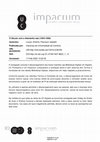
Revista Estudos do Século XX, Jun 17, 2015
A navegação consulta e descarregamento dos títulos inseridos nas Bibliotecas Digitais UC Digitali... more A navegação consulta e descarregamento dos títulos inseridos nas Bibliotecas Digitais UC Digitalis, UC Pombalina e UC Impactum, pressupõem a aceitação plena e sem reservas dos Termos e Condições de Uso destas Bibliotecas Digitais, disponíveis em https://digitalis.uc.pt/pt-pt/termos. Conforme exposto nos referidos Termos e Condições de Uso, o descarregamento de títulos de acesso restrito requer uma licença válida de autorização devendo o utilizador aceder ao(s) documento(s) a partir de um endereço de IP da instituição detentora da supramencionada licença. Ao utilizador é apenas permitido o descarregamento para uso pessoal, pelo que o emprego do(s) título(s) descarregado(s) para outro fim, designadamente comercial, carece de autorização do respetivo autor ou editor da obra. Na medida em que todas as obras da UC Digitalis se encontram protegidas pelo Código do Direito de Autor e Direitos Conexos e demais legislação aplicável, toda a cópia, parcial ou total, deste documento, nos casos em que é legalmente admitida, deverá conter ou fazer-se acompanhar por este aviso.
Ο que havia de velho e de novo na política externa nazi? Quem levou a cabo essa política? Donde v... more Ο que havia de velho e de novo na política externa nazi? Quem levou a cabo essa política? Donde vinham esses responsáveis/executantes e em que medida se adequavam à orientação política em causa? Estas interrogações inserem-se num debate muito mais amplo que vem sendo travado desde há décadas sobre a relação entre regimes parlamentares e ditaduras fascistas. Conforme os pontos de vista, assim se tem considerado a instauração dos diversos fascismos como um acto de rendição das democracias ou um..
La vice-présidente de la comunnauté juive du Portugal, Esther Mucznik a décrit la vie de Moses Am... more La vice-présidente de la comunnauté juive du Portugal, Esther Mucznik a décrit la vie de Moses Amzalak comme «un exemple de dévouement à la cause du judaïsme et de la Communauté. Il ne suffit pas seulement de le rappeler, il faut aussi suivre son exemple.» Une opinion partagée par l’ancien président, Samuel Levy, qui note qu’Amzalak a laissé à la communauté l’exemple à suivre dans la défense de ses intérêts et de la vie judaïque. Pour ces deux dirigeants, Amzalak n’est pas seulement une grande figure du passé mais un modèle à suivre aujourd’hui comme demain. Dans un livre publié en 2007, l’auteure et l’auteur de cet article, se sont penchés sur cette personnalité de renom et sont arrivés à des conclusions sensiblement différentes.








Uploads
Book Reviews by antónio louçã
Zwischen 1986 und 1996 war Soares in zwei Amtsperioden taatspräsident. In diesem Falle aber fungierte er als linkes Bollwerk gegen die rechten Regierung von Aníbal Cavaco Silva. Seine späteren Bewerbungen für das Amt des Vorsitzenden des EU-Parlaments (1999) und erneut für das des portugiesischen Staatspräsidenten (2006) scheiterten. Danach überraschte Soares mit einer rhetorischen Annäherung an linke Bewegungen, dem freundlichen Austausch mit Hugo Chávez und dem Liebäugeln mit Globalisierungsgegnern.
Doch seine historische Rolle bleibt die des Totengräbers der Nelkenrevolution.
Die meisten Putschisten flüchteten nach Franco-Spanien, vier jedoch, darunter der General Freire Damião suchten in der BRD-Botschaft Zuflucht. Gerade am Tag und um die Uhrzeit des Putsches landete in Lissabon, vermutlich nur ein Zufall, der Staatssekretär Karl Moersch (FDP), später Staatsminister. Er unterkamm in der Botschaft, aber es ist nichts über eine Rolle Moerschs in der Flüchtlingskrise bekannt.
Asyl konnten die Vier allerdings in der Botschaft nicht bekommen, es gab ja keine Asylvereinbarung zwischen Portugal und Deutschland.
Ausserdem wollte der deutsche Botschafter Fritz Caspari seine Beizehungen zu den portugiesischen Machthabern nicht durch einen Anschein von Komplizenschaft mit den Putschisten schaden. Caspari war ein Ausnahmefall im deutschen diplomatischen Dienst, denn er war kein Nazi gewesen. Seine Rolle in der Nelkenrevolution ist bis jetzt weniger von der Geschichtswissenschaft beachtet als er eigentlich verdient hätte. Aber sein amerikanischer Pendant, Frank Carlucci, hat öffentlich bezeugt wie er bei Caspari das Verständnis gefunden hat, das er bei seinem Boss, Henry Kissinger, nicht finden konnte.
Beide, Carlucci und Caspari, setzten auf Wahlen und nicht auf Putschen. Nicht überraschend, also, dass die Botschaft den Staatspräsidenten, General Costa Gomes, sofort von der Anwesenheit der Vier Flüchtlinge im Botschaftsgebäude informierte. Allerdings übermittelte sie ihm auch die Bitte der Vier, die einen Freigeleit nach Spanien wollten.
Gomes wollte eine Nacht Bedenkzeit. Aber in der Nacht vom 11. zum 12. März hat er eigentlich nicht geschlaffen, denn er musste eine militärische Versammlung 200 Militärs, meistens Offizieren, vorsitzen, die entschieden haben, eine neue Regierung und einen Revolutionsrat zu gründen, die ganze Finanzwirtschaft, sämtliche Banken also, und die Grossindustrie zu verstaatlichen, die Streitkräfte zu säubern, und die Wahlen am 25. April zu bestätigen. Auf der Tagesordnung stand auch die Diskussion über die eventuelle Erschiessung der Putschisten, die abgelehnt wurde.
Am Morgen früh liess Gomes den Botschafter Fritz Caspari wissen, er würde keinen Freigeleit gewähren und die Vier mussten sich einfach ergeben. Aus Bonn hatte die Botschaft Anweisung, auf den Freigeleit zu bestehen. Caspari machte sich also auf dem Weg zum Präsidentenpalast, um zu verhandeln. Mittlerweile waren schon Hunderte Demonstranten, alarmiert über die Anwesenheit der Vier, vor den Toren der Botschaft gezogen. Casparis Dienstwagen wurde bei der Ausfahrt durchsucht und, als er sich bei den anwesenden Truppen beschwehrte, haben diese ihre Maschinengewehren auf ihn gerichtet. Später legte er einen formellen Protest darüber, hörte von den portugiesischen Behörden bloss die Antwort, sie konnten sich nicht mehr auf die Truppen verlassen.
Mit Gomes hat schliesslich Caspari eine Einigung getroffen, wobei die Vier sich ergeben, sie werden vor normalen, nicht vor Sondergerichten gestellt, sie behalten ihren Rang bis zum Gerichtsurteil und die Familien dürfen nach Deutschland fliegen, wenn sie so wollen. Fünf Familienangehörige des Generals Freire Damião machten von dieser Bedingung Gebrauch, unterkammen in Baden-Würtemberg. Alle andere meinten, sie seien in Portugal in Sicherheit.
Dann musste der Botschafter unter militärischer Schutz, auf einem Panzer, in die Botschaft zurück, und mussten die Vier aus der Botschaft in Panzern evakuiert werden.
In den folgenden Monaten, gab es viel Nachspiel. Ein Ausschuss des Bundestags debatierte darüber, Moersch war Wortträger der Bonner Regierung, die von der CDU/CSU unter heftiger Kritik stand, weil sie angeblich die Vier nicht hätte ergeben dürfen. Die Botschaft musste sich rechtfertigen, teils durch Hinweise auf ihre Sicherheitslage, teils auf die ehrenhafte Behandlung der Vier. Ab und zu kamen wieder Gerüchte über die Gründung eines Sondergerichts, die die Botschaft beunruhigten, aber es war nichts drin. Die Vier sind ein Jahr in Haft geblieben, wurden dann amnestiert und haben sich bei der Botschaft bedankt.
The economist Moses Bensabat Amzalak, born in 1892, became the president of the CIL in 1927 and remained for 52 years, until his death in 1978, its indisputable political and spiritual leader. After him, the community knew several short-living leaderships, none of them comparable to Amzalak's importance and charisma. Until now, his followers have always remembered him as an example.
But Amzalak was also a very important personality in the handful of Portuguese fascist leaders, and not only because of his personal friendship with the Portuguese dictator Salazar. He was one of the owners of the daily newspaper O Século, the ideological organ of the military coup that destroyed the First Republic. Moreover, O Século clearly supported in January 1935 Hitler's policy about the Sarre. In the meantime, Amzalak was opening in the institute of economics, whose director he was, a bureau for German studies, financed by the Third Reich, and meant to reinforce the connections between the Portuguese university and the nazified academic world of Germany.
The head of the German Legation to Lisbon, Baron von Hoyningen-Huene, was deeply grateful for these achievements. On the 26 th and on the 28th of January that year, he visited Amzalak's institute and reciprocally invited the Jewish leader for a dinner party in the German Legation. Three weeks later, Huene sent a letter to the German Foreign Office (AA), suggesting that a high decoration of the German Red Cross be given to Amzalak. By the same time, O Século was printing a special edition of nazi propaganda. According to Huene's letter, Amzalak's pro-German achievements should let the AA put his jewishness aside. And so it did: in July 1935, Amzalak received the German decoration.
During the four following years O Século made a permanent propaganda of nazi policies, sometimes even against Salazar's politics. When the Portuguese diplomats voted in Geneva against the remilitarisation of Rhineland, O Século greeted it. Germany's support to Franco's Spain had more importance for the newspaper than the Nuremberg laws against the Jews, which were never targeted by any criticism of O Século.
In 1937 Amzalak asked Huene to get a miniature of the decoration, so that he could use it in social events. A few weeks later, he received a letter from Huene, thanking him for his „collaboration". And he soon received a new visit of the diplomat at his institute, which gave him his first occasion to show the decoration in public. The „collaboration" was to last until 1939 and to strongly upset the powerful British Embassy in Lisbon. As for Amzalak, he would remember those years much later as « the most beautiful » of his life.
During the War, Portugal became the only exit gate out of Europe for tenths of thousands of refugees. The main international organisation for the relief of Jewish refugees addressed Amzalak, gave him important sums and entrusted him with quartering, feeding and organising the departure of those refugees to overseas. However, one representative of the WCJ, Isaac Weissman, a refugee himself, colided with Amzalak and therefore denounced his former collaboration with the nazis. The WJC believed Weissman's and other refugees' charges, who openly criticized the Jewish leader, distanced itself and cooled down its relations with the CIL. It was only in 1951, when Weissman left to Israel, that a normal relationship was re-established.
The polemics about Amzalak started in 2005, when the historian António Louçã mentioned Weissman's charges in a book that he published. By that time, it was clear that O Século had served the nazi propaganda, but a doubt remained about Weissman's charges on the decoration. The CIL reacted vigorously against the statements of the Portuguese historian, labelling them as wrong and slandering and promised to make a research together with the WJC in order to clean the name of its former leader.
The WCJ did not say anything about the subject and the CIL has also preferred in the meantime to drop it. But Louçã and Paccaud went on with their own research and found in the Political Archives of the German Foreign Office the « smoking gun », proving the decoration and in the Portuguese archives several photos proving the complicity Amzalak-Huene. The results of their research came out now in a book by the publishing house Fim de Século under the title O segredo da rua d'O Século.
Only once, did the Third Reich decorate a Jewish leader. In 1935, the president of the Comunidade Israelita de Lisboa, (CIL) received the 1rst class Merit Cross of the German Red Cross. A few years later, the World Jewish Congress (WJC) froze its relations with the Portuguese Jewish community, but kept the silence on the subject. The evidences of this story are now presented for the first time in a Swiss-Portuguese research published in Lisbon by „Fim de Século".
Drafts by antónio louçã
An attentive reading of Rosa Luxemburg's "Mass strike, party and unions", of her letters, of her 1918 writings on the Russian Revolution, including the Breslau-paper "Zur russischen Revolution", shows that she highly valued the central role of the mass movement, but not the soviets, which she nearly ignores in 1906 and she just mentions scarcely in the summer 1918, in Breslau. Her reservations about the Bolshevik policy towards the Constituant Assembly are the rear side of her ignoring the soviets.
But immediately after the outbreak of the German Revolution, her liberation from Breslau and her arrival in Berlin, Rosa Luxemburg starts making the case for a Government of the Workers' and Soldiers' Councils and against the elections for a German Constituant Assembly. The last two months of her life are the time for a spectacular turn in her attitude towards the Soviets.
Books by antónio louçã
In the specific case of Portugal, the exports of German weaponry not only took the place of the British Vickers-Armstrong, for many years the main supplier of the Portuguese Army, but also succeeded in beating the competing Italian offer. During the war, German weapons came to be critical in the negotiations about tungsten, being the most coveted goods that Germany had for an exchange with tungsten. Eltze was the right man to lead this kind of negotiation.
Papers by antónio louçã
Zwischen 1986 und 1996 war Soares in zwei Amtsperioden taatspräsident. In diesem Falle aber fungierte er als linkes Bollwerk gegen die rechten Regierung von Aníbal Cavaco Silva. Seine späteren Bewerbungen für das Amt des Vorsitzenden des EU-Parlaments (1999) und erneut für das des portugiesischen Staatspräsidenten (2006) scheiterten. Danach überraschte Soares mit einer rhetorischen Annäherung an linke Bewegungen, dem freundlichen Austausch mit Hugo Chávez und dem Liebäugeln mit Globalisierungsgegnern.
Doch seine historische Rolle bleibt die des Totengräbers der Nelkenrevolution.
Die meisten Putschisten flüchteten nach Franco-Spanien, vier jedoch, darunter der General Freire Damião suchten in der BRD-Botschaft Zuflucht. Gerade am Tag und um die Uhrzeit des Putsches landete in Lissabon, vermutlich nur ein Zufall, der Staatssekretär Karl Moersch (FDP), später Staatsminister. Er unterkamm in der Botschaft, aber es ist nichts über eine Rolle Moerschs in der Flüchtlingskrise bekannt.
Asyl konnten die Vier allerdings in der Botschaft nicht bekommen, es gab ja keine Asylvereinbarung zwischen Portugal und Deutschland.
Ausserdem wollte der deutsche Botschafter Fritz Caspari seine Beizehungen zu den portugiesischen Machthabern nicht durch einen Anschein von Komplizenschaft mit den Putschisten schaden. Caspari war ein Ausnahmefall im deutschen diplomatischen Dienst, denn er war kein Nazi gewesen. Seine Rolle in der Nelkenrevolution ist bis jetzt weniger von der Geschichtswissenschaft beachtet als er eigentlich verdient hätte. Aber sein amerikanischer Pendant, Frank Carlucci, hat öffentlich bezeugt wie er bei Caspari das Verständnis gefunden hat, das er bei seinem Boss, Henry Kissinger, nicht finden konnte.
Beide, Carlucci und Caspari, setzten auf Wahlen und nicht auf Putschen. Nicht überraschend, also, dass die Botschaft den Staatspräsidenten, General Costa Gomes, sofort von der Anwesenheit der Vier Flüchtlinge im Botschaftsgebäude informierte. Allerdings übermittelte sie ihm auch die Bitte der Vier, die einen Freigeleit nach Spanien wollten.
Gomes wollte eine Nacht Bedenkzeit. Aber in der Nacht vom 11. zum 12. März hat er eigentlich nicht geschlaffen, denn er musste eine militärische Versammlung 200 Militärs, meistens Offizieren, vorsitzen, die entschieden haben, eine neue Regierung und einen Revolutionsrat zu gründen, die ganze Finanzwirtschaft, sämtliche Banken also, und die Grossindustrie zu verstaatlichen, die Streitkräfte zu säubern, und die Wahlen am 25. April zu bestätigen. Auf der Tagesordnung stand auch die Diskussion über die eventuelle Erschiessung der Putschisten, die abgelehnt wurde.
Am Morgen früh liess Gomes den Botschafter Fritz Caspari wissen, er würde keinen Freigeleit gewähren und die Vier mussten sich einfach ergeben. Aus Bonn hatte die Botschaft Anweisung, auf den Freigeleit zu bestehen. Caspari machte sich also auf dem Weg zum Präsidentenpalast, um zu verhandeln. Mittlerweile waren schon Hunderte Demonstranten, alarmiert über die Anwesenheit der Vier, vor den Toren der Botschaft gezogen. Casparis Dienstwagen wurde bei der Ausfahrt durchsucht und, als er sich bei den anwesenden Truppen beschwehrte, haben diese ihre Maschinengewehren auf ihn gerichtet. Später legte er einen formellen Protest darüber, hörte von den portugiesischen Behörden bloss die Antwort, sie konnten sich nicht mehr auf die Truppen verlassen.
Mit Gomes hat schliesslich Caspari eine Einigung getroffen, wobei die Vier sich ergeben, sie werden vor normalen, nicht vor Sondergerichten gestellt, sie behalten ihren Rang bis zum Gerichtsurteil und die Familien dürfen nach Deutschland fliegen, wenn sie so wollen. Fünf Familienangehörige des Generals Freire Damião machten von dieser Bedingung Gebrauch, unterkammen in Baden-Würtemberg. Alle andere meinten, sie seien in Portugal in Sicherheit.
Dann musste der Botschafter unter militärischer Schutz, auf einem Panzer, in die Botschaft zurück, und mussten die Vier aus der Botschaft in Panzern evakuiert werden.
In den folgenden Monaten, gab es viel Nachspiel. Ein Ausschuss des Bundestags debatierte darüber, Moersch war Wortträger der Bonner Regierung, die von der CDU/CSU unter heftiger Kritik stand, weil sie angeblich die Vier nicht hätte ergeben dürfen. Die Botschaft musste sich rechtfertigen, teils durch Hinweise auf ihre Sicherheitslage, teils auf die ehrenhafte Behandlung der Vier. Ab und zu kamen wieder Gerüchte über die Gründung eines Sondergerichts, die die Botschaft beunruhigten, aber es war nichts drin. Die Vier sind ein Jahr in Haft geblieben, wurden dann amnestiert und haben sich bei der Botschaft bedankt.
The economist Moses Bensabat Amzalak, born in 1892, became the president of the CIL in 1927 and remained for 52 years, until his death in 1978, its indisputable political and spiritual leader. After him, the community knew several short-living leaderships, none of them comparable to Amzalak's importance and charisma. Until now, his followers have always remembered him as an example.
But Amzalak was also a very important personality in the handful of Portuguese fascist leaders, and not only because of his personal friendship with the Portuguese dictator Salazar. He was one of the owners of the daily newspaper O Século, the ideological organ of the military coup that destroyed the First Republic. Moreover, O Século clearly supported in January 1935 Hitler's policy about the Sarre. In the meantime, Amzalak was opening in the institute of economics, whose director he was, a bureau for German studies, financed by the Third Reich, and meant to reinforce the connections between the Portuguese university and the nazified academic world of Germany.
The head of the German Legation to Lisbon, Baron von Hoyningen-Huene, was deeply grateful for these achievements. On the 26 th and on the 28th of January that year, he visited Amzalak's institute and reciprocally invited the Jewish leader for a dinner party in the German Legation. Three weeks later, Huene sent a letter to the German Foreign Office (AA), suggesting that a high decoration of the German Red Cross be given to Amzalak. By the same time, O Século was printing a special edition of nazi propaganda. According to Huene's letter, Amzalak's pro-German achievements should let the AA put his jewishness aside. And so it did: in July 1935, Amzalak received the German decoration.
During the four following years O Século made a permanent propaganda of nazi policies, sometimes even against Salazar's politics. When the Portuguese diplomats voted in Geneva against the remilitarisation of Rhineland, O Século greeted it. Germany's support to Franco's Spain had more importance for the newspaper than the Nuremberg laws against the Jews, which were never targeted by any criticism of O Século.
In 1937 Amzalak asked Huene to get a miniature of the decoration, so that he could use it in social events. A few weeks later, he received a letter from Huene, thanking him for his „collaboration". And he soon received a new visit of the diplomat at his institute, which gave him his first occasion to show the decoration in public. The „collaboration" was to last until 1939 and to strongly upset the powerful British Embassy in Lisbon. As for Amzalak, he would remember those years much later as « the most beautiful » of his life.
During the War, Portugal became the only exit gate out of Europe for tenths of thousands of refugees. The main international organisation for the relief of Jewish refugees addressed Amzalak, gave him important sums and entrusted him with quartering, feeding and organising the departure of those refugees to overseas. However, one representative of the WCJ, Isaac Weissman, a refugee himself, colided with Amzalak and therefore denounced his former collaboration with the nazis. The WJC believed Weissman's and other refugees' charges, who openly criticized the Jewish leader, distanced itself and cooled down its relations with the CIL. It was only in 1951, when Weissman left to Israel, that a normal relationship was re-established.
The polemics about Amzalak started in 2005, when the historian António Louçã mentioned Weissman's charges in a book that he published. By that time, it was clear that O Século had served the nazi propaganda, but a doubt remained about Weissman's charges on the decoration. The CIL reacted vigorously against the statements of the Portuguese historian, labelling them as wrong and slandering and promised to make a research together with the WJC in order to clean the name of its former leader.
The WCJ did not say anything about the subject and the CIL has also preferred in the meantime to drop it. But Louçã and Paccaud went on with their own research and found in the Political Archives of the German Foreign Office the « smoking gun », proving the decoration and in the Portuguese archives several photos proving the complicity Amzalak-Huene. The results of their research came out now in a book by the publishing house Fim de Século under the title O segredo da rua d'O Século.
Only once, did the Third Reich decorate a Jewish leader. In 1935, the president of the Comunidade Israelita de Lisboa, (CIL) received the 1rst class Merit Cross of the German Red Cross. A few years later, the World Jewish Congress (WJC) froze its relations with the Portuguese Jewish community, but kept the silence on the subject. The evidences of this story are now presented for the first time in a Swiss-Portuguese research published in Lisbon by „Fim de Século".
An attentive reading of Rosa Luxemburg's "Mass strike, party and unions", of her letters, of her 1918 writings on the Russian Revolution, including the Breslau-paper "Zur russischen Revolution", shows that she highly valued the central role of the mass movement, but not the soviets, which she nearly ignores in 1906 and she just mentions scarcely in the summer 1918, in Breslau. Her reservations about the Bolshevik policy towards the Constituant Assembly are the rear side of her ignoring the soviets.
But immediately after the outbreak of the German Revolution, her liberation from Breslau and her arrival in Berlin, Rosa Luxemburg starts making the case for a Government of the Workers' and Soldiers' Councils and against the elections for a German Constituant Assembly. The last two months of her life are the time for a spectacular turn in her attitude towards the Soviets.
In the specific case of Portugal, the exports of German weaponry not only took the place of the British Vickers-Armstrong, for many years the main supplier of the Portuguese Army, but also succeeded in beating the competing Italian offer. During the war, German weapons came to be critical in the negotiations about tungsten, being the most coveted goods that Germany had for an exchange with tungsten. Eltze was the right man to lead this kind of negotiation.
No ocidente, várias vozes do dono vinham defendendo há décadas que os povos árabes eram imaturos para a democracia. Assim se justificava habitualmente as fotografias de família dos nossos governantes democráticos em conúbio descarado com Mubarak, ou em arranjos financeiros como os de Sarkozy com Kadhafi. "Cada povo tem o que merece", dizia-se, e a democracia parlamentar está muito além do que os povos árabes podem querer. A islamofobia justificava a tolerância perante as ditaduras. Hoje, subitamente, descobre-se que são os povos árabes que estão a ir além da democracia de tipo ocidental e estão a esboçar algo muito mais avançado do que ela. Orquestra-se então, apressadamente, uma campanha mediática para fazer passar a ideia de que o horizonte mais ambicioso do movimento só pode ser o de imitar a civilização cristã e as suas democracias. Os mesmo povos que antes não podiam querer uma democracia parlamentar, agora não podem querer outra coisa. O corolário lógico que daqui resulta é o de considerar todo o processo da Praça Tahrir como uma aberração anarquizante e demagógica, em que as decisões são tomadas ao monte. Mas, neste aspecto, o processo da Praça Tahrir e os seus contemporâneos apenas dão corpo a uma lei universal de todas as revoluções. Sempre que uma qualquer sociedade sofreu uma ruptura da sua paz podre, houve classes que antes estavam marginalizadas e, subitamente, começaram a ter poder e a tomar decisões. Aquilo que a horrorizada imprensa dos nossos dias descreve como um processo de decisão tumultuoso era apenas um poder que em parte passava a ser exercido aos olhos de toda a gente, sem segredos de Estado nem arranjos de bastidores.